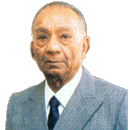 His name was Mafatlal Mohanlal Raichand Mehta but everyone knew him as Mafat kaka (uncle), including Mother Teresa.
His name was Mafatlal Mohanlal Raichand Mehta but everyone knew him as Mafat kaka (uncle), including Mother Teresa.
Mafat kaka, a legend of India's over-Rs 30,000 crore (Rs 300 billion) diamond industry died on September 12, leaving behind his three sons, a daughter and wife Pramila.
He was born in 1917 in Palanpur, a town on the Gujarat-Rajasthan border once known for it's fanatically vegetarian Jain families who controlled diamond trade of the world.
His father died when he was five years old. With elder brother Chandulal he shifted to Bombay (now Mumbai) and lived in the middle-class area near Prathna Samaj.
Before he turned 16, he learnt the ropes of the trade and went on to become one of the pioneers of diamond trade.
Along with four other Palanpuri families he started importing rough diamonds from Africa, got it polished and sold it in Bombay and Calcutta (now Kolkata).
Then five Palanpuri Jain families started exporting on modest scale. They would monopolise the trade for more than four decades. Most of them started out dealing in pearls but eventually shifted to diamonds.
Most of the old timers were secretive and rarely talked about their businesses or their social activities or huge donations. Mehta was also secretive about his business and rarely talked about all the toil behind his millions.
Mehta started India's first diamond factory in Marine Drive, Mumbai. Palanpur Jains had a special knack to sense new business. Mehta, who never went to a college, left for Antwerp when he was 21.
In Belgium, the Jews had a monopoly on the diamond trade. Mehta somehow managed to get in their good books.
Soon he was doing so well, that many Palanpuri families sent their wards to apprentice at Mehta's company, Jayam.
They youngsters were taught everything from how to close a deal to satisfying a buyer.
In a few decades, Palanpuri Jains were vying with the Jews for domination of the international diamond trade from Tel Aviv and Antwerp.
Mehta, a hardcore trader, was a one-man management institute that showed the country what diamonds were all about and the tricks of international trade.
In 1956, Mehta set up another company in Antwerp -- Jitendra Brothers. Following its success, he set up another company, Jem, in 1960.
As businesses grew, he groomed his sons Jitendra, Mahindra, Ashwin and Narendra.
Under his guidance, the four started Jayam Diamonds, Sameer Diamonds, Paras Diamonds and Prime Jewellers, taking the business enterprise to even greater heights.
Mehta's life changed when he met Mother Teresa.
He handed the diamond business to his sons and devoted his time to social service. He always said, "If you feed a hungry person he will feel hungry again in a matter of hours, but if you sponsor somebody's education, he will fulfill the hunger of others. That is why education is a life-giver."
Mehta was a major donor to Mother Teresa's charity but he never talked about it. He used to say, "I prefer creating hospitals and schools for girls than building Jain temples. I believe in making poor people self-dependent."
According to one estimate, he must have donated or managed charity of more than Rs 100 crores (Rs 1 billion) over the last two decades.
When it came to donations, he preferred hospitals to temples, but he remained a stout Jain.
All events in his Europe and Israel offices started only after prayers to Mahavir.
He stated a charitable trust in the name of his mother Diwalibhen Mohanlan Mehta. The trust runs the Ruthumbara College in Juhu, Mumbai which educates about 21,000 girls across Mumbai free.
In Palanpur, Mehta-run trusts manage an orphanage, a blind school and a blind girls' hostel.
(With inputs from Sanjay Trivedi)






 © 2025
© 2025